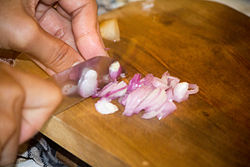Shallot
Shallots are a type of onion. They are a botanical variety of the species Allium cepa.[1] The shallot was previously classified as a separate species, A. ascalonicum.[2]
| Shallot |
|---|
 A whole shallot |
| Species |
| Allium cepa var. aggregatum |
| Cultivar group |
| Aggregatum Group |
Growth
Shallots seldom produce seeds.[3] They are increased by dividing its compound bulbs.[3] These are made up of several bulblets or cloves held together at the base. The bulblets are planted the same as onion sets.[4] Each set develops into a compound set. The mature bulbs are harvested, cured and stored the same way as onions. In suitable storage, the bulbs keep from one season to the next.
Flavour
The flavor of shallots is a little milder than onions. It’s used for flavoring curries. Both leaves and cloves are used. Leaves are also consumed as green vegetables. Like their cousins onions and garlics, this is also considered as non-vegetarian food in India. Most of the crop is produced for sale in the green state. But some dry bulbs are also used. They are also used for pickling.
Shallot Media
Shallot plant (A. cepa var. aggregatum) growing in Castelltallat, Spain
Shallots being chopped for satay
Bawang goreng, consisting of crispy deep-fried shallots, is a popular garnish in Indonesia.
References
| Wikimedia Commons has media related to Lua error in Module:Commons_link at line 62: attempt to index field 'wikibase' (a nil value).. |
- ↑ Fritsch R.M. & Friesen N. (2002). "Chapter 1: Evolution, domestication, and taxonomy". In H.D. Rabinowitch and L. Currah (ed.). Allium crop science: recent advances. Wallingford, UK: CABI Publishing. p. 21. ISBN 0-85199-510-1.
- ↑ "Allium ascalonicum information". Germplasm Resources Information Network. USDA. Archived from the original on 2010-05-30. Retrieved 2010-08-20.
- ↑ 3.0 3.1 Nannette Richford. "How to propagate shallots". SFGATE. Retrieved 6 June 2015.
- ↑ Steve Albert (15 February 2012). "Early planting onions, shallots, and garlic". Harvest to Table. Retrieved 6 June 2015.






